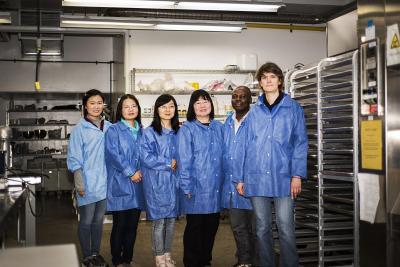Iris Joye

Find Related People by Keyword
Associate Professor Cereal Chemistry and Biochemistry
Graduate Coordinator - MSc and PhD Food Science Programs
Iris Joye completed her B.Sc., M.Sc. and Ph.D. in Bioscience Engineering at the University of Leuven (KU Leuven, Belgium). The focus of her M.Sc., Ph.D. and part of her postdoctoral research was on Cereal Science. She joined the Department of Food Science at Guelph in 2016. Prior to this appointment, she was appointed as assistant professor Food Biophysics at the University of Leuven. Her research focuses on protein structure, chemistry and functionality during cereal processing and the use of cereal biopolymers to design encapsulation and delivery systems for bioactive and food quality improving molecules.
Academic History
B.Sc. in Bioscience Engineering, University of Leuven (2002)
M.Sc. in Bioscience Engineering (Chemistry), University of Leuven (2005)
Ph.D. in Bioscience Engineering, University of Leuven (2010)
Affiliations and Partnerships
Member American Association of Cereal Chemists (AACC-I)
Member of Institute of Food Technologists (IFT)
Member of the AACC International Annual Meeting Program Team (2017-2018 meetings)
Member Ontario Cereal Crop Committee (OCCC)
Part-time faculty at University of Leuven (KU Leuven, Belgium)
Professional Advisory Committee of Canadian Celiac Association (CCA)
Centre for Sustainable Nanomaterials Innovation
Research impact
With consumer demand for gluten free bakery products increasing due to concerns about adverse health effects of gluten, Iris is researching gluten structures and interactions in baked products. She hopes that she will contribute to a better insight in gluten structure, in order to better mimic the structure to develop better gluten free breads. Iris is also trying to make encapsulation systems using cereal biopolymers. Using these, she will be able to better stabilize water soluble vitamins and colourants. She believes the design and characterization of biopolymer-based delivery systems can revolutionize the food sector with regard to making more nutritious food and improving overall food quality and safety.
Current Research projects
How do gluten proteins build structure and impact cereal product quality?
Gluten proteins have unique network forming properties, which impact cereal processing and cereal end product quality. In bread making applications, the properties of this gluten network are a main factor in dough handling properties and bread quality. In today’s commercial breads, the properties of this network are optimized by the addition of chemical or enzymatic additives. In other cereal products, gluten network formation is not as pronounced and, sometimes, not even desired. The structure of gluten during cereal processing, the properties a gluten network should display for optimal cereal product quality, and the effect of certain quality-improving additives on a molecular and macromolecular scale, remain under debate. However, these insights are needed in order to meet the needs of the cereal sector such as dealing with inherent flour variability, suboptimal gluten performance and the production of high quality gluten-free products. This research combines classical protein characterization techniques with more innovative techniques to resolve protein structure, interactions and functionality during processing and storage of cereal products.
How can we use the unique properties of cereal biopolymers to produce highly performant delivery systems?
The fortification of food products with bioactive molecules usually poses specific challenges with regard to ensuring the stability and functionality of the bioactive molecules in a complex food matrix, during food processing and upon ingestion. Encapsulation of these labile bioactive molecules, in order to protect them from harsh conditions, is one of the possible strategies to make food fortification more efficient. Cereals contain a variety of biopolymers (i.e. proteins, starch and non-starch polysaccharides), which all have their specific properties and can be used to produce nano- or micro-scale carrier and delivery systems for these bioactive molecules. This research specifically focuses on liquid anti-solvent precipitation as a simple, yet versatile technique to produce biopolymer-based nano- or micro-particles. Unraveling molecular structures and interactions are key to a better understanding and engineering of these systems for specific applications.
How can we increase the stability and quality of frozen dough products?
The demand for frozen dough and partially baked bread products is expanding due to the consumer quest for convenience and freshness. However, freezing of unbaked or par baked bread is known to induce quality deterioration in the macrostructure and texture of the final products. The incorporation of fiber in these products may improve the structural and textural stability of these products during freezing and subsequent thawing while also contributing to the recommended intake of dietary fiber in our daily diet. This project focuses on ‘locally grown fibers’ to improve the cereal products. Molecular characterization focusing on structures and interactions between the added fiber and the molecules making up the cereal product matrix enables us to better understand, but also engineer healthy, convenient and fresh cereal products.
How can we unlock more functionality and health benefits from our daily produced grain products?
Wheat-based products are a major part of our current diet. Therefore, it is key to unlock and fully exploit the health benefits that are contained in grains. This project focuses on coloured grains and on postharvest processing of grains to alter their nutritional value and increase the availability of health-improving molecules. The effect of grain selection as well as postharvest processing is looked at on both a fundamental (molecular interactions and structures) as well as a more applied (processing and end product quality) level.
Graduate Student formation
Iris strives to maintain a welcoming, dynamic and stimulating team environment in her lab. To facilitate this, she holds monthly meetings with all undergrad and grad students to provide updates on their work, along with any challenges or concerns. Iris also notes that many of her students come from different backgrounds, and so she makes it a priority to ensure all students feel comfortable, and encourages them to speak up during these meetings.
At the beginning of projects Iris provides more guidance and has students meet with her at least once a week to discuss progress. From there, students are encouraged to just come in and talk to her whenever they need to. One of her teaching philosophies is to allow students to experiment and try out ideas even if they fail. The final aim is to train graduates that ask the right research questions and do not hesitate to learn from and find ideas in other disciplines. She believes this allows for growth and better learning. In her students, she also works on developing management, supervision, communication, organization and networking skills, all vital for their future professional career.
- M.Sc. students will be presented a project and will be closely guided along the experimental path, the data analysis hurdles and the final data interpretation and presentation.
- Ph.D. students are encouraged to contribute to the shaping of their project, propose the most appropriate methodology and data analysis tools and develop their own clear presentation style.
Featured Publications
Joye, I.J., Draganski, A., Delcour, J.A. and Ludescher, R.D. (2012). Monitoring molecular oxygen depletion in wheat flour dough using Erythrosin B phosphorescence: a biophysical approach. Food Biophysics, 7, 138-144.
Joye, I.J. and McClements, D.J. (2014). Production of nanoparticles by anti-solvent precipitation for use in food systems. Trends in Food Science and Technology, 34, 109-123.
Joye, I.J., Davidov-Pardo, G., Ludescher, R.D. and McClements, D.J. (2015). Fluorescence quenching study of resveratrol binding to zein and gliadin: towards a more rational approach to resveratrol encapsulation using water-insoluble proteins. Food Chemistry, 185, 261-267.
Decamps, K., Joye, I.J., De Vos, D.E., Courtin, C.M. and Delcour, J.A. (2016). Molecular oxygen and reactive oxygen species in breadmaking processes: Scarce, but nevertheless important. Critical Reviews in Food Science and Nutrition, 56, 722-736.
Corradini, M.G., Demol, M., Boeve, J., Ludescher, R.D. and Joye, I.J. (2017). Fluorescence spectroscopy as a tool to unravel the dynamics of protein nanoparticle formation by liquid antisolvent precipitation. Food Biophysics, 12, 211-221.
